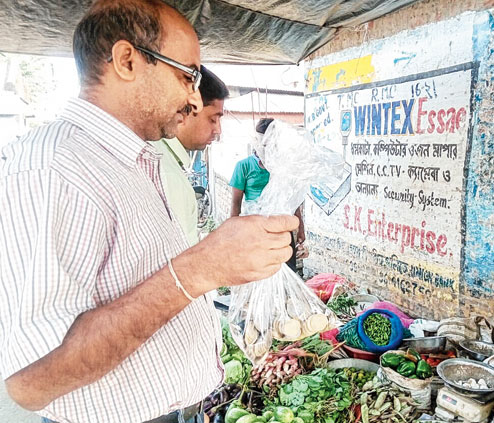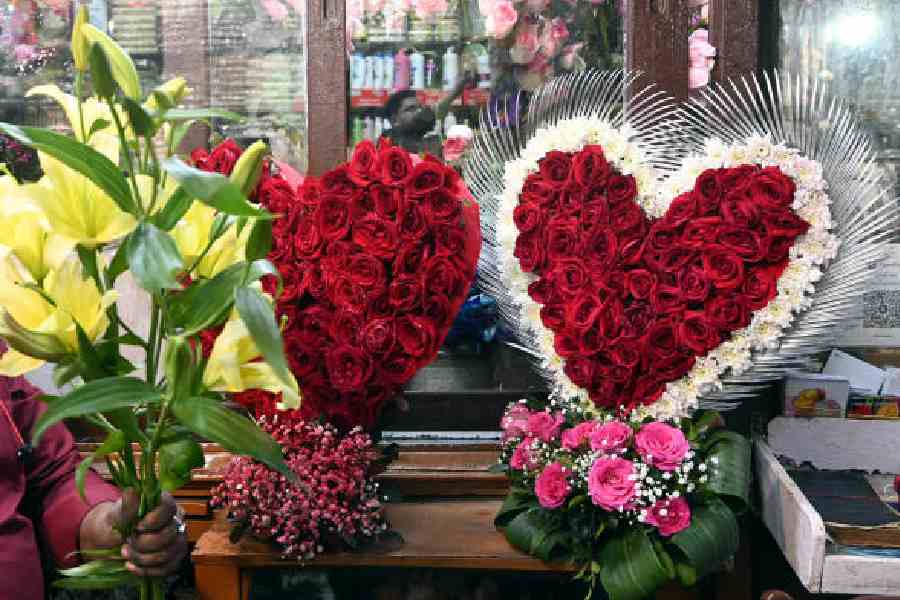The Prime Minister's decision to scrap Rs 500 and Rs 1,000 notes had its effect on people across the state. While railway counters in Raiganj witnessed long queues of people who did not wish to travel but bought tickets only to exchange their Rs 500 notes for smaller denominations, a wedding had to be postponed in a Malda village.
The Telegraph lists some of the effects of the demonetisation

WHAT: Long queues at railway ticket counters
WHERE: Raiganj railway station
WHY: Six to seven persons lined up outside a ticket counter around 5.30am. Each of them bought tickets worth Rs 10-15 and handed Rs 500 notes to the clerks at the counter.
"I took Rs 500 notes from them and gave back the balance in denominations of Rs 100, Rs 50 and Rs 10. In a few minutes, I ran out of change and was forced to ask for exact amounts. This made people angry. They were buying tickets just to obtain change," a railway clerk said.
Railway ticket counters will accept old Rs 500 and Rs 1,000 notes.
Samaresh Roy, a resident of Raiganj, said he got the idea to change Rs 500 note at the railway counter from a friend.
"After yesterday's announcement by Modi that banks and ATMs would be shut today, I was wondering how to get rid of at least one Rs 500 note to cover daily expenses. The railway booking counter was a good idea," he said.

WHAT: A schoolteacher went to the market with a plastic bag full of 5-rupee coins
WHERE: Bandar Bazar, Raiganj
WHY: Anup Kumar Sinha, who had invited a few friends home, did not know what to do with his Rs 500 and Rs 1,000 notes. He had some money in denominations of Rs 100 but did not dare spend them to buy fish and vegetables.
He broke the piggy bank where he had been collecting Rs 5 coins for the past two years. He counted the money, it amounted to Rs 1,400
WHAT: A wedding was postponed
WHERE: Gopalpur village in Malda
WHY: Mango trader Firoz Sheikh had withdrawn Rs 1.8 lakh from the bank to cover the expenses of his only sister's wedding on Friday. The money was in Rs 500 and Rs 1,000 denominations.
"Since this morning, I have been running from pillar to post trying to get the notes exchanged for Rs 100 currencies. No one could help me out. I had no option but to postpone my sister's wedding. The groom is a schoolteacher and I have no idea how he will react to this postponement. He might refuse to marry my sister due to the delay. I have Rs 440 in Rs 100 and Rs 10 notes and I have no idea when the bank will replace the cash that I had withdrawn," he said.

WHAT: A lawyer separated from her husband for 20 years was paid Rs 25,000 in Rs 1,000 denominations
WHERE: Durgapur court
WHY: The lawyer told the judge her former husband was trying to harass her by paying her in Rs 1,000 notes, evoking laughter in the courtroom.
The husband's lawyer said the judge told the woman, who was arguing her own case, that she could have the money changed in the bank or post-office. She eventually accepted the money.
The woman said her husband, a railway employee who lived in Halisahar in North 24-Parganas, did not regularly give her the Rs 5,000 he had agreed to pay as monthly maintenance for her daughter's studies.
"I filed a case in 2013 in Durgapur court, demanding the money. After that, my husband resumed paying the money for our child's maintenance. One-and-a-half years ago, he had paid me Rs 15,000 but he hasn't paid the rest of the amount," she said. On Wednesday, there was a hearing of the case in Durgapur court.
After the husband paid the money in Rs 1,000 notes, her husband's lawyer Kallol Ghosh argued that she could change the Rs 1,000 notes from the bank tomorrow.

"She is a literate person and a lawyer too. So, she should have known the rules better. The Rs 1,000 notes have become invalid but the Prime Minister has made it clear that the notes could be changed in banks and post offices till December 30. So, my client has not done anything illegal and it was not his intention to harass her," said Ghosh.
The judge echoed the husband's lawyer.
WHAT: Fish sellers accepted Rs 500 notes only if the customers made purchases worth over Rs 300
WHERE: Bolpur Fish Market
WHY: Initially, the fishmongers were reluctant to take Rs 500 or Rs 1,000 notes. But soon, they realised that the fish would not sell if they stuck to their decision.
They then started accepting Rs 500 and Rs 1000 notes.
Sujit Mahata, a fish seller, said: "Our problem is from both sides. We don't know whether our wholesalers will accept these notes from us. On the other hand, if we don't sell the fish, we will face a huge loss as fish is perishable item."

WHAT: A family from Mumbai came to visit Santiniketan by car from Calcutta. They had planned to buy a few paintings and handicrafts from Santiniketan. But they returned without buying any souvenir of Tagore's abode of peace as they had only Rs 500 and Rs 1000 notes with them.
WHERE: Sonajhuri Haat, Santiniketan
WHY: The Dholakias had come to Calcutta to visit a relative and and decided to go to Santiniketan from there, by car on Wednesday morning.
The family, comprising three members, had only 12 notes in denominations of Rs 100 and the rest was in Rs 500 and Rs 1000 notes. The toll plazas or restaurants along the highway did not take Rs 500 or Rs 1000 notes from them. So, they were forced to spend Rs 1,200 in Rs 100 notes.
When they went to buy the handicrafts or paintings at stalls, the sellers refused to take the notes.
Text by our Correspondents, pictures by Nantu Dey, Chayan Majumdar, Santosh Kumar Mandal and Indrajit Roy










